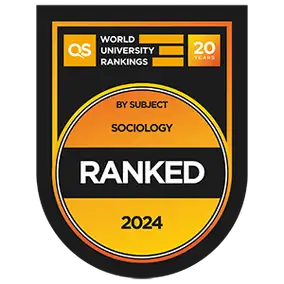Where you can study
International students
International students are not New Zealand citizens or residents.
Specialise in Sociology for your Master of Arts at Massey
Sociology is about understanding and describing our local society and its global setting. Sociologists are interested in almost all aspects of the social world and in your MA (Sociology) you’ll consider questions such as:
- how is society structured?
- how is society changing?
- what divides or unites social groups?
- what causes the inequalities we see in society?
- how does power operate?
With a Massey MA (Sociology) you’ll ask challenging questions about how power structures function in the social world. You’ll study culture, ethnicity, class, inequality, gender, mass media, politics, environment and social change as well as individual and group interactions.
A Master of Arts in Sociology is a good fit if you:
- have an undergraduate degree in sociology
- are keen to follow your intellectual curiosity and develop your research skills
- want to investigate a particular aspect of sociology for your research report or thesis.
Planning information
If you study full-time, you’ll take 120 credits per year or 60 credits per semester.
Not all courses are available in each semester.
The Master of Arts (Sociology) is a parts-based qualification. That means you must complete the first part, before moving to the second.
Grades achieved in the first 60 credits will determine eligibility for progression to Part Two.
- For the coursework pathway a minimum B grade average is required.
- For the research pathway a minimum B+ grade average is required.
If you enrol in a thesis, you commence with Thesis (90 or 120 credits) Part 1, followed by Thesis (90 or 120 credits) Part 2 in the next enrolment period. Both parts combine to meet the thesis requirements with a single grade assigned to each part.
If the thesis cannot be submitted at the end of the initial Thesis (90 or 120 credits) Part 2 enrolment, you must re-enrol in Thesis (90 or 120 credits) Part 2 and pay fees each semester until submission is made.
Official regulations
To understand what you need to study and must complete to graduate read the official rules and regulations for this qualification.
You should read these together with all other relevant Statutes and Regulations of the University including the General Regulations for Postgraduate Degrees, Postgraduate Diplomas, and Postgraduate Certificates.
Returning students
For returning students, there may be changes to the majors and minors available and the courses you need to take. Go to the section called ‘Transitional Provisions’ in the Regulations to find out more.
In some cases the qualification or specialisation you enrolled in may no longer be taking new enrolments, so may not appear on these web pages. To find information on the regulations for these qualifications go to the Massey University Calendar.
Please contact us through the Get advice button on this page if you have any questions.
Courses you can enrol in
Course planning key
- Prerequisites
- Courses that need to be completed before moving onto a course at the next level. For example, a lot of 200-level courses have 100-level prerequisite courses.
- Corequisites
- Courses that must be completed at the same time as another course are known as corequisite courses.
- Restrictions
- Some courses are restricted against each other because their content is similar. This means you can only choose one of the offered courses to study and credit to your qualification.
Part One: Coursework Pathway (120 credits) or Research Pathway (Between 60 and 90 credits)
Compulsory courses
Course code: 176701 Current Issues and Theories 30 credits
An examination of key concepts, theories and debates in contemporary social theory.
View full course detailsCourse code: 176702 Advanced Social Inquiry 30 credits
An advanced study of methodological issues pertinent to social research. The course is designed to assist the planning of postgraduate theses and reports.
View full course detailsSubject courses
Course code: 176704 Working Sociologically: An Advanced Practicum 30 credits
An advanced course in the practical application of social science knowledge to real world challenges faced by social and governmental agencies and organisations.
View full course detailsCourse code: 176718 Environmental Sociology 30 credits
An exploration of the interrelations between society and the environment, with an examination of major contemporary environmental issues from a sociological point of view. Among the major issues covered are consumerism, population growth, resource limits, development, political conflicts, environmental groups and environmental values.
View full course detailsCourse code: 176799 Research Report (30) 30 credits
Part Two: Coursework Pathway
Course code: 176873 Research Report Sociology (60) 60 credits
Part Two: Research Pathway
Course code: 176816 Thesis 120 Credit Part 1 60 credits
A supervised and guided independent study resulting in a published work.
View full course detailsCourse code: 176817 Thesis 120 Credit Part 2 60 credits
A supervised and guided independent study resulting in a published work.
View full course detailsCourse code: 176881 Thesis 90 Credit Part 1 45 credits
A supervised and guided independent study resulting in a published work.
View full course detailsCourse code: 176882 Thesis 90 Credit Part 2 45 credits
A supervised and guided independent study resulting in a published work.
View full course detailsCourse code: 176883 Thesis 90 credits
A supervised and guided independent study resulting in a published work.
View full course detailsCourse code: 176899 Thesis 120 credits
A supervised and guided independent study resulting in a published work.
View full course detailsEntry requirements
Admission to Massey
All students must meet university entrance requirements to be admitted to the University.
Specific requirements
To enter the Master of Arts (Sociology) you will have been awarded or qualified for:
-
a Bachelor of Arts degree (or equivalent) with a major in the intended postgraduate subject, with at least a B grade average across the 200/300 level major courses
-
a Bachelor of Arts (Honours) with a subject in the intended postgraduate subject or a Postgraduate Diploma in Arts with an endorsement in the intended postgraduate subject, or an equivalent qualification, with at least a B+ grade average across the 700-level courses for entry to the Research Pathway or a B grade average across the 700-level courses for entry to the Coursework Pathway.
If you have a BA (Hons) or PGDipArts from Massey University in the intended Master of Arts subject as outlined above, you may apply for credit towards Part One of the qualification.
You will need to provide copies of all official academic transcripts for studies taken at all universities other than Massey University.
English language requirements
To study this qualification you must meet Massey University's English language standards.
English language skills
If you need help with your English language skills before you start university, see our English for Academic Purposes (EAP) courses.
Fees and scholarships
Fees, student loans and free fees scheme
Your tuition fees may be different depending on the courses you choose. Your exact fees will show once you have chosen your courses.
There will also be some compulsory non-tuition fees and for some courses, there may also be charges for things such as study resources, software, trips and contact workshops.
- Get an estimate of the tuition fees for your qualification
- View a list of non-tuition fees that may be payable
Already know which courses you're going to choose?
You can view fees for the courses that make up your qualification on the course details pages.
Student loans (StudyLink) and Fees Free scheme
You may be eligible for a student loan to help towards paying your fees.
The New Zealand Government offers fees-free tertiary study for eligible domestic students. Find out more about the scheme and your eligibility on the Fees Free website. To use the site's eligibility checking tool, you will need your National Student Number.
Current and returning Massey students can find their National Student Number in the student portal.
- Student loans (StudyLink)
- Fees Free
- Student portal
Scholarship and award opportunities
Find more scholarships and awardsFees disclaimer
This information is for estimation purposes only. Actual fees payable will be finalised on confirmation of enrolment. Unless otherwise stated, all fees shown are quoted in New Zealand dollars and include Goods and Services Tax, if any. Before relying on any information on these pages you should also read the University's Disclaimer Notice.
Careers and job opportunities
Your Master of Arts (Sociology) will give you the knowledge and competencies you need to start your career as a policy analyst, researcher or community development organiser. You‘ll learn a range of intellectual and practical skills that will stand you in good stead in the job market.
Loads of career options
This qualification opens up a world of opportunity to be involved in influencing a broad number of social issue outcomes such as healthy housing, youth development, Māori wellbeing, health promotion or gender analysis of policy. You’ll approach this not only from the perspective of government and local-body policy, but also from the perspectives of local communities and community organisations.
You’ll learn to apply your critical sociology analysis skills to a number of decision-making scenarios for better social outcomes. This could take many forms including policy development, project planning, legal submissions or strategic organisational management.
You could work in areas such as:
- research
- communications
- project management
- governance
- charitable trusts
- social marketing
- journalism
- advocacy
- teaching and lecturing
- policy analysis - public, private and third sector (non-government organisations, public-private partnerships, not-for-profit, voluntary and charity organisations)
- youth development
- community development
- politics
- government agencies - local, regional and central
- non government organisations (NGOs) - housing, Māori land trusts, health service providers, disability advocacy and support, youth development.
International students
New Zealand is a great place to study. Massey University’s reputation is supported by our international rankings, accreditations and associations. We are rated five star plus by the QS World University Rankings.
Massey University has small class sizes, and our lecturers and staff are friendly and approachable.
As an international student, there are entry requirements that will apply to you. We recommend that you apply at least three months before your anticipated start date so your application can be processed in time. There are additional steps you will need to take. These include obtaining a visa and travel bookings if your study is to be in New Zealand.
What our students say
“Everything started with my Bachelor and Master of Arts at Massey University.”

Accreditations and rankings
Related study options
Sociology – Graduate Certificate in Arts
Use your social knowledge for a meaningful career. With Massey’s Graduate Certificate in Arts (Sociology), you can study sociology without completing a second bachelor’s degree.
Sociology – Bachelor of Arts (Honours)
Take your study of sociology to the next level. Show your in-depth understanding of sociology and its application to the real world with Massey's Bachelor of Arts (Honours) (Sociology).
Sociology – Bachelor of Arts
Massey's Bachelor of Arts (Sociology) will build your understanding of some of the biggest issues facing the world today.
Sociology – Diploma in Arts
Sociologists ask the questions that are crucial to understanding some of the biggest issues facing the world today. Study Massey’s Diploma in Arts (Sociology) to better understand how society works.
Sociology – Postgraduate Diploma in Arts
Take your study of sociology to the next level with Massey’s Postgraduate Diploma in Arts (Sociology). Get the knowledge and competencies you need to start your career.
Sociology – Graduate Diploma in Arts
Use your social knowledge for a meaningful career. The Graduate Diploma in Arts (Sociology) will give you the equivalent of an undergraduate major in sociology without completing a second bachelor’s degree.
Useful planning information

Key information for students
Compare qualifications and academic information across different New Zealand institutions. Learn more on careers.govt.nz
